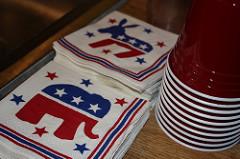
Image by Hillary.
With discussion of politics dominating news outlets and water cooler conversation, sometimes people bring up this question:Does a person's age influence a person's political affiliation?
Let's take the Baby Boomers as an example (those born 1946 to 1964). As a group, do they affiliate more with liberal, conservative, or even moderate political ideals?
In January of 2015, the Gallup company posted an article showing how conservative political affiliation increases in age in the polling of these four voting-eligible generations: Millennials (28%), Generation X (35%), Baby Boomers (44%), and Traditionalists (48%).
First of all, several factors can influence trends in the political affiliation of an age group. Demographers consider many influences, for example the age effect or the period effect.
If political affiliation is influence by the age affect, then the assumption would be that people ages 52 and 70 years of age would consistently poll at 44% conservative in their political affiliation in every presidential election past (i.e., 1960 election), present (2016 election), and future (i.e., 2072 election).
If political affiliation is influenced by the period effect, then the assumption would be that all people who experienced the same cultural events would demonstrate the same trends in political affiliation.
In the case of the Baby Boomers, the major forces would include (but are not limited to) the availability of reliable birth control, the expansion of civil rights, the US involvement in the Vietnam War, the computer revolution, and the end of the Cold War.
The assumption is that any generation of people who experience these events would choose the same political affiliation--if somehow those cultural events someone had happened to people born decades before or decades after.
Or stated another way, the period affect would assume that people 52 to 70 in past elections of a significant time gap (such as the 1960 presidential election) would perhaps not poll at 44% conservative--because they were shaped by different historical events, such as the Great Depression and World War II. The period effect would also anticipate different rates of conservatism in those 52 to 70 in future elections of a significant time gap (such as in the 2072 presidential election).
It's difficult to determine the difference between the effects of growing older and the effects of traveling through specific historical events. Nevertheless, consider the following findings about the correlation between age and political affiliation.
In July of 2014, Gallup posted an analysis of age and political affiliation that observed that middle aged people and older adults trended Republican in higher percentages as they aged--with the exception of older Baby Boomers, who trended Democrat.
In September of 2016, The Pew Research Center published a report on party affiliation by a number of demographic categories. Notably, Baby Boomer had a closer gap than most other generations, with 45% registered as Democrat to 49% registered as Republican.
Four months after the last presidential election, The Pew Research Center published a report of how various generations identified their political affiliations from 2000 to 2016. They found that while the identification of liberal or Democrat increased over these sixteen years, the oldest voters did lean more towards conservative or Republican affiliation over this time span.
After reviewing data collected by Pew and Gallop, what patterns emerge about the Baby Boomers?
Yes, they are trending more conservative as they grow older, but not by a very wide margin. They are still more liberal than the generation above them (the Traditionalists, also called the Greatest Generation or the Silent Generation). And Baby Boomers who were young adults in the 1960s tend to maintain their liberal ideology at a higher rate than those who were young adults in the 1980s.
It's also important to note that individuals can defy patterns. Just because you meet an older adult, you can't reliable guess their political ideology, so it's probably better to suspend judgment and to avoid stereotyping.
While it's interesting to read the results of surveys and polls, treating people as more complex, nuanced, and dynamic than their demographic category is a sound idea anyway!
Related:
Older Americans 2012 Federal Report
Pew Data on Technology Use
A Full Life by Jimmy Carter: A Book Review

